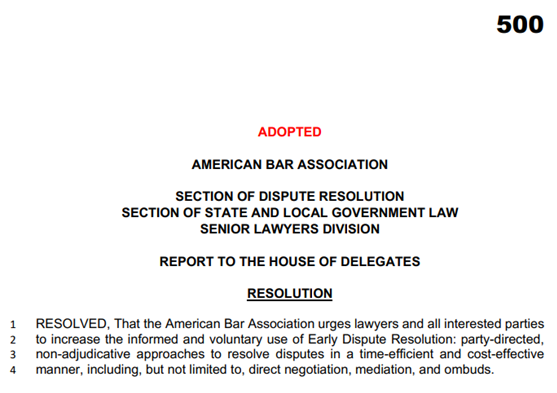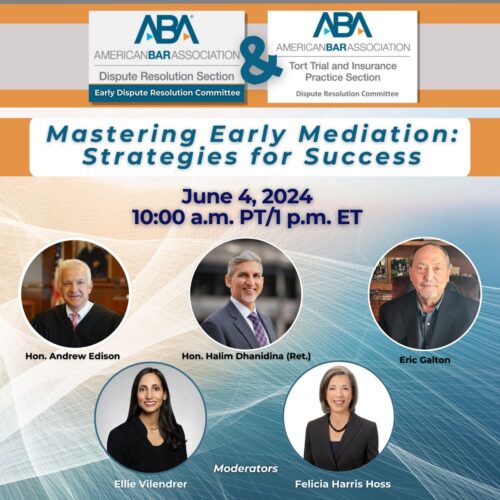Early Mediations (aka EDR)
Through early mediation, parties proactively and confidentially manage disputes from inception making it possible to preserve relationships and reputations, minimize costly distractions, reduce litigation expense and uncertainties, and stay focused on what matters most to them.
In traditional litigation, meaningful settlement discussions typically occur months, even years, after a lawsuit or arbitration demand is filed. By the time the parties engage a mediator, the underlying conflict has escalated, the parties’ relationship has deteriorated, and significant costs – in both time and money – have been expended.
One of the most pivotal points in the life-cycle of a dispute occurs when decisions are made about when and how the parties will interact to resolve the conflict. Parties who choose to engage a mediator before filing a lawsuit or arbitration proceeding — or shortly thereafter — value the chance to confidentially exchange meaningful information and dialogue as part of an objective evaluation of the conflict and assessment of both risks and prospective opportunities for resolution.
Effective early mediation processes promote greater objectivity by (i) reducing informational gaps inherent in the early stages of conflict and (ii) facilitating a robust risk analysis to utilize in forecasting reasonable settlement ranges. While an effective early mediation process — like most mediations — facilitates the parties’ respective understanding of each other’s positions, early mediations have the added benefit of timely addressing uncertainty and promoting informed strategic decisions about the true cost of the conflict on the parties’ broader public and private goals, dreams, and plans.
Early mediation provides parties greater control, in both settlement and litigation.
In cases that are resolved early in their life-cycles, the value of engaging in an early mediation process is obvious. But early mediation efforts can also be valuable to parties in disputes that not able to be resolved as quickly or easily.
Because the mediation process allows parties to confidentially open lines of communication for meaningful exchanges of information, in many instances, early mediations lead to a resolution. But even when those efforts fall short of full resolution, parties who engage in an early mediation process may also utilize the time to negotiate an agreed-upon, more focused process for information gathering and sharing that includes a timeline for continued confidential settlement discussions.
The entire process allows parties to maintain greater control over the costs, timing, and approach to resolution, while also appreciating that, for parties who are not able to find common ground, they may still seek resolution on a journey to – and through – the courthouse.
Felicia's Approach to Early Mediation
Felicia is often engaged to assist parties through early mediations. To enhance the effectiveness of settlement efforts before a lawsuit, arbitration, or extensive discovery, Felicia meets with counsel and the parties privately to assist them in confidentially exchanging sufficient information from which to objectively assess risks, estimate case value, make informed settlement decisions, and engage in an effective and efficient early mediation session.
Experienced litigants often utilize EDR.
Experienced litigants (like businesses) have been effectively utilizing pre-litigation and early mediations to resolve disputes for decades. What has been less known is that early mediations are equally available to less experienced litigants, like those who find themselves in the courthouse once-in-a-lifetime. That news is spreading, however, and EDR is becoming a topic of growing interest among lawyers, and within bar associations and law schools across the country.
In 2018, the American Bar Association (ABA) Section of Dispute Resolution created the Early Dispute Resolution Committee. Since 2022, Felicia has worked closely with the ABA EDR Committee. In 2023, while Felicia was Fellow to the Committee, she drafted a comprehensive report in support of a then-proposed ABA Resolution 500 urging greater informed and voluntary use of EDR.
From 2023-2025, Felicia served as Co-Chair of the ABA EDR Committee and, on February 5, 2024, spoke in support of Resolution 500 during the ABA Mid-Year Meeting in Louisville, Kentucky at which the ABA House of Delegates unanimously adopted Resolution 500.

After more than 20 years as an advocate in complex commercial and civil litigation, and with fewer and fewer lawsuits being tried, Felicia has seen first-hand how valuable it can be for parties to meaningfully open lines of communication early in the lifecycle of a conflict. And, she frequently accepts speaking opportunities to discuss the value of EDR in building successful client relationships and law practices.
Felicia also completed EDR neutral training through the EDR Institute.
On June 4, 2024, the ABA Early Dispute Resolution Committee and the ABA Tort Trial & Insurance Practice Section’s ADR Committee co-sponsored this webinar entitled Mastering Early Mediation: Strategies for Success, which available for viewing here.
“The courts of this country should not be the place where resolution of disputes begins. They should be the places where the disputes end after alternative methods of resolving disputes have been considered and tried.”
